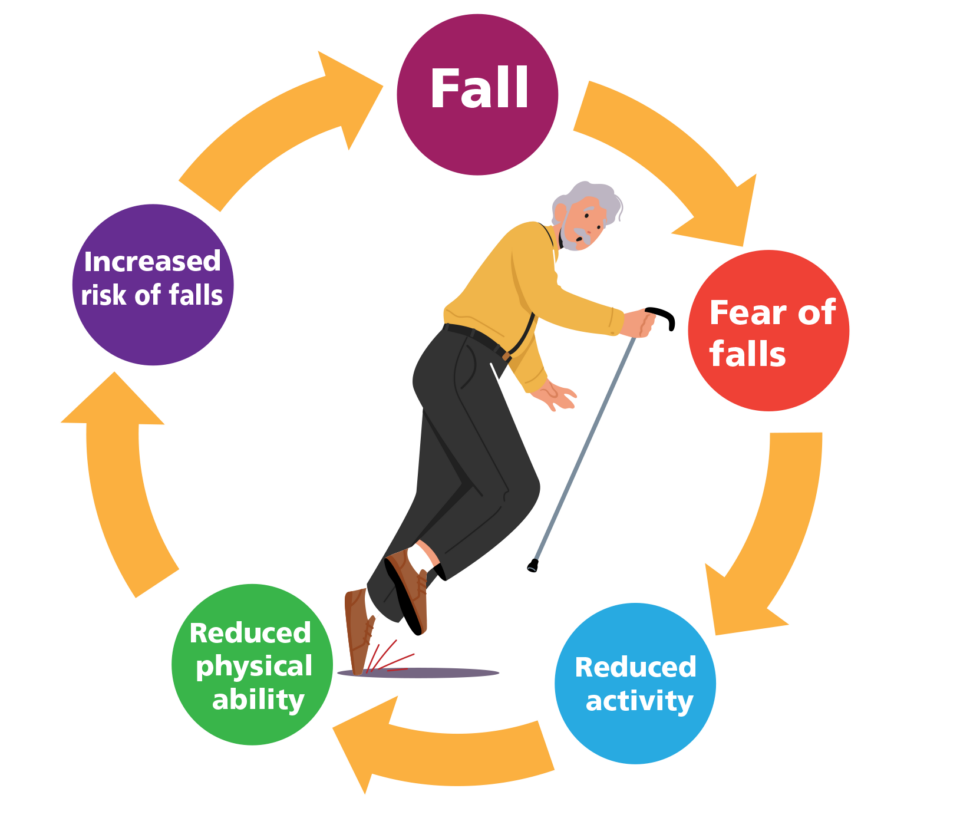Fear of falling
Fear and anxiety
Fear of falling can often develop because of a fall, near falls or loss of confidence due to feelings of reduced strength, balance, and general wellbeing.
Prolonged fear of falling often results in anxiety. Anxiety is the minds response to perceived danger which results in physical symptoms such as palpitations, sweating, trembling, and overwhelming feelings of stress.
The psychological and physical symptoms of fear and anxiety of falling can lead to reduced physical activity, quality of life and independence. As seen in the diagram below, fear can lead to a viscous cycle of falls and fear.

A fall leads to the fear of falls, which in turn leads to reduced activity. This reduced activity reduces your physical ability which increases the risk of a recurrent fall.
How can you break the cycle to reduce fear and falls?
Talking
- Share your fear and concerns with someone you trust. People often find that talking to family, friends or professionals is the first step in finding solutions to help.
- Talking about your fears can help to process the emotions and help you to understand your feelings and responses.
- Having a strong network of family, friends and colleagues that can help you manage the emotional and practical steps in reducing fears of falling.
Breathing
- Simple, diaphragmatic breathing exercises are known to reduce stress and anxiety by triggering the body’s natural relaxation response.
- Place your hands gently onto your stomach just below the ribs with the middle fingertip of both hands touching. Ensure to keep the shoulders and neck relaxed.
- Take a slow, deep breath in until you notice your hands being gently raised by your stomach and notice how your fingertips move away from each other. The aim is to breath into the bottom of lungs for as long as comfortable.
- As you slowly and gently release the breath, notice how the hands lower back down with the stomach and the fingertips meet once again.
- Breathing exercises are easy to practice anywhere but are particularly useful before completing a task that you associate with fear or even following a fall or near miss.
Relaxation
Much like the principles of breathing exercises, other relaxation techniques can also help to reduce fear and anxiety of falling:
- walking
- swimming
- listening to relaxing music
- meditation
Positive reinforcement
As seen in the previous diagram, cycles can be created by thought patterns which lead to physical outcomes. This is also true of positive thought patterns, therefore, moving your focus to positive thoughts helps to increase confidence and improved capabilities. Try to:
- remember all of the times that you did not fall
- notice any improvements that you have made
- set small goals and acknowledge when you have met them
Fit and well
Our physical well-being, independence and capability is heavily dependent on keeping the body as functional as is can be:
- keep active
- sleep well
- hydrate
- eat a healthy, balanced diet
- take your medications as prescribed
- know when to rest
- have your eyes checked
- continue or start a hobby
Page last reviewed: August 15, 2025
Next review due: August 15, 2026
Problem with this page?
Please tell us about any problems you have found with this web page.
Report a problem